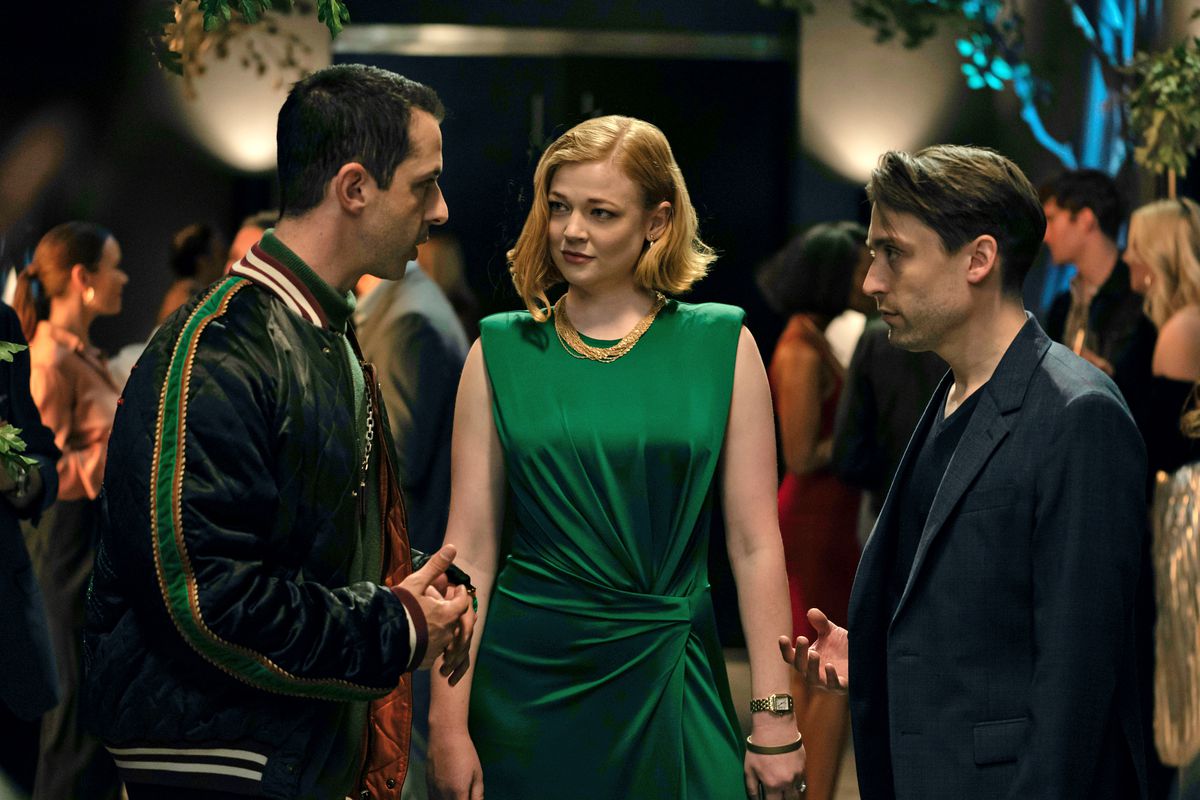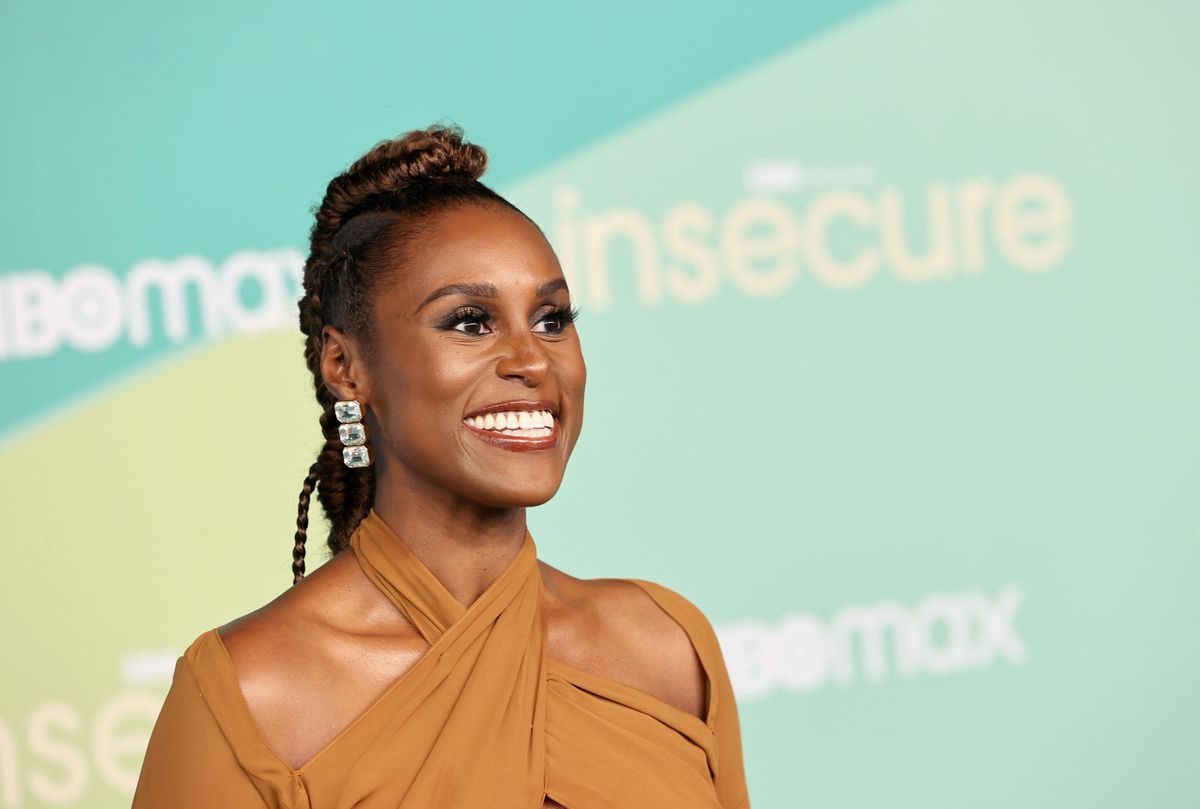For three seasons now, Succession has arguably delivered some of the best dialogue on TV. The characters are as dynamic as they are flawed, as rich as they are dysfunctional (and the other kind of rich). They're rarely likable and seldom redeemable. And yet, there's an undeniably twisted joy in watching Logan Roy and his privileged offspring fight for control of their family empire, screwing each other over at every turn. We're…rooting for them. Kind of.
Given the brilliance of both Succession's writing and acting, it comes as no surprise that HBO's crown jewel took home the Golden Globe for Best Drama Series on Sunday, along with two other wins: Best Actor for Jeremy Strong, who plays golden boy turned pariah Kendall Roy, and Best Supporting Actress for Sarah Snook, who stars as the power-hungry but often overlooked Shiv Roy. But what exactly goes into developing such complex characters that we love to hate (or hate to love)?
For InStyle's February Badass Women issue, we asked the series' writer and co-executive producer Georgia Pritchett to shed some light on the process. And as it turns out, some of the best one-liners delivered by Kieran Culkin are inspired by Pritchett's own overactive imagination — as well as her lifelong struggle with anxiety. "It's quite cathartic to put your darker stuff into a character like Roman Roy," says Pritchett, whose new book My Mess Is a Bit of a Life: Adventures in Anxiety will be released on Feb. 8. "It's a very anonymous way to express yourself."
Pritchett's other credits include The Shrink Next Door, Veep, and HBO's Run, among many others. Ahead, she tells InStyle about how anxiety fuels her work, facing sexism in the entertainment industry, and, for you really sick slime puppies out there, her personal take on Roman's unconventional bond with Gerri.
InStyle: In your new book, you open up about living with anxiety since childhood. Why share your journey now?
Georgia Pritchett: We all look around, particularly on social media, and think, "Everyone's doing better than I am." I finally got to an age where I thought it was time to be honest. We all play roles in our lives and relationships, and as a comedy writer, I thought it was my role to be happy. I could never admit to anything other than that. And, of course, being British basically means being emotionally repressed. [laughs]
There is a stigma surrounding mental health in the UK, and there's a sense that you have to have a stiff upper lip and just carry on without making a fuss. I had to get to a pretty desperate place to be ready to go to therapy. It was scary to find myself in a situation where I didn't have the words to express what I was feeling.
Succession is not a light and happy show, by any means. As someone with anxiety, what’s it like to write for characters with so many neuroses of their own?
When [series creator] Jesse [Armstrong] first told me about the show, I thought, "Do I want to write for a lot of rich white men who are poisoning the world?" But it was an exciting challenge to dig deep into their characters and try to understand them — not just judge them, but find some compassion and explore why they behave the way they do. Part of what makes Succession so compelling, and what interests me, is that it's about what money can't solve. Money can solve a lot of things, but it can't solve issues of physical health and emotional wellbeing.
The tragedy of the show isn't really "Who's going to be in charge?"; it's "Who's going to earn their dad's love and acceptance and approval?" They're all much more desperate for his love and approval than they are for the title or money.
Most people can relate to having some issues with family dynamics, and those are just amplified on Succession.
How has your mental health impacted your work, and vice versa?
Being a scriptwriter is a good job for an anxious person because you're literally putting words in other people's mouths. It's a very anonymous way to express yourself, and it's quite cathartic to put your darker stuff into a character like Roman Roy. Being anxious basically means you've got a really good imagination, which is helpful for writing. But when you're female and anxious in such a male industry, it's hard to make yourself heard.
And comedy writing is notoriously a boys’ club. How did it feel to be the only woman in so many writing rooms over the years?
For so long, I wondered where the other women were. When I finally got to work with women in the [United] States, it was mind-blowing to sit opposite people who dressed like me and had similar frames of reference and life experiences. I suddenly saw myself reflected, which was incredibly validating. It made me realize, "Oh, this is what it's like to be a white man every minute of every day." It also made me sad, because so many people never see themselves reflected, either on screen or in real life. Since then, it's almost been harder — because now if I'm in a room with all men, I know what I'm missing.
In your book, you write about having to develop a thick skin and being ignored, interrupted, or insulted at work. How did you learn to come into your own power?
I've had a sense of defiance and rebelliousness with producers or people who put obstacles in my way. I wasn't going to let anyone stop me from communicating things that were important to me or other women. I've been persistent and relentless for decades, but after a while, you get tired of fighting and being resilient and thick-skinned. Picking yourself back up is tiring. Women are so primed not to complain, but there's a difference between complaining and speaking truth.
For so long … women’s roles were basically the nag or the slag, the sensible girlfriend or the nosy neighbor. So to write for women in the lead of great shows is thrilling.
Who are some other women you admire?
Phoebe Waller-Bridge, Sharon Horgan, and Michaela Coel, who write incredibly enriching shows like Fleabag [and Catastrophe] and I May Destroy You. It's better for our culture as a whole to hear authentic voices and diverse stories. Of course, those shows all came from a place of discrimination where actors were thinking, "I'm not being given the part, so I'm going to write one for myself." It's just another example of the onus being on women to solve the imbalance, but things will only truly improve when we're all trying to solve it together.
You were a writer on Veep, which was a women-led series. And Succession has its share of strong female characters with Shiv and Gerri Kellman, who’s played by J. Smith-Cameron. What is it like to write for those parts?
I think the joy of writing for Selina [Meyer] on Veep, and Shiv and Gerri on Succession, is that they are funny, complicated women who are flawed. They're not perfect mothers, not perfect wives. For so long over here in the UK, the women's roles were basically the nag or the slag, the sensible girlfriend or the nosy neighbor. So to write for women in the lead of great shows is thrilling.
Speaking of character dynamics, how do you feel about the will-they-or-won’t-they relationship between Roman and Gerri?
Oh, I'm a big champion of the Roman and Gerri romance. It's weird and dirty, but also feels really touching because he's so damaged. He so longs for intimacy but is incapable of having a normal, rewarding, intimate relationship. So the closest he can come to that is this strange oedipal thing with Gerri. It's heartbreaking, in a way.
Roman is a favorite of mine because he's one of the few characters that really loves people, and that love comes first. He really loves his dad, his siblings, Gerri. And he puts those people first, which a lot of the others don't. Most people can relate to having some issues with family dynamics, and those are just amplified on Succession.
Source: Read Full Article







